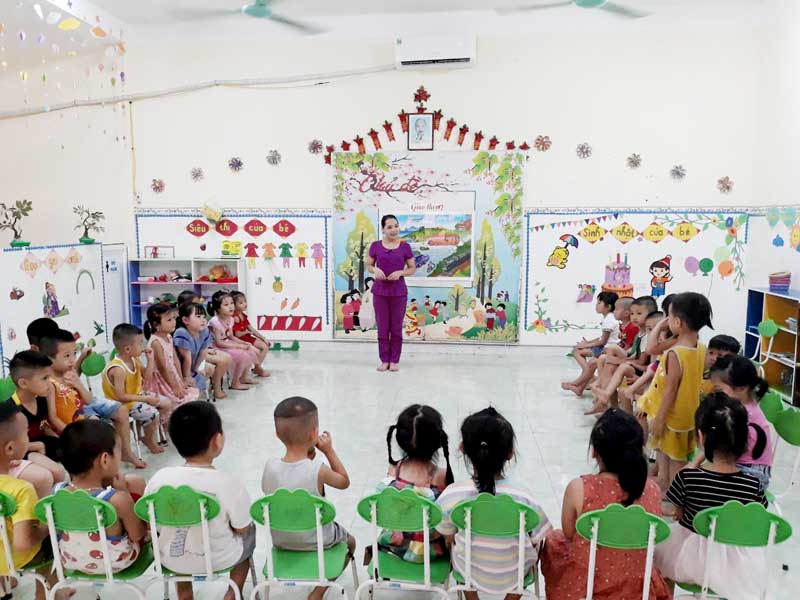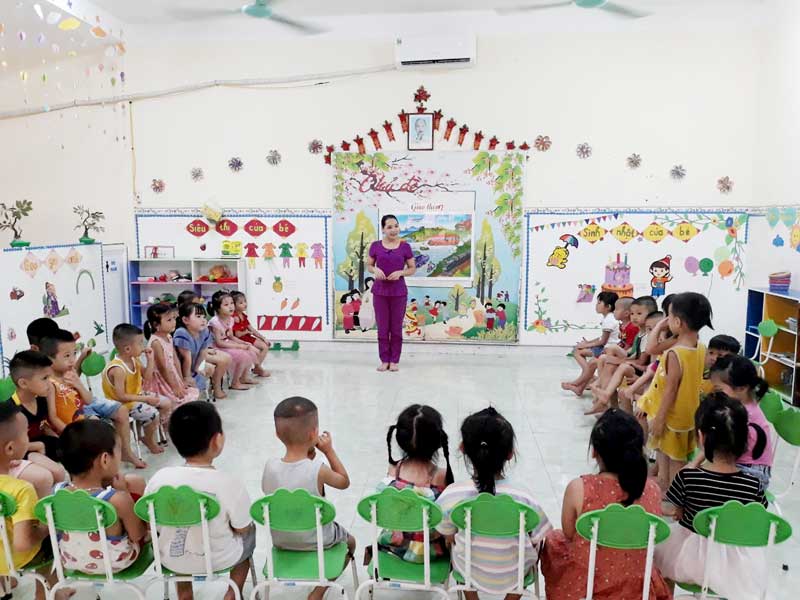
(HBO) – Implementing the Party Central Committee’s Resolution 29 on fundamental and comprehensive education and training reforms, and the resolution of the district Party congress in 2015-2020 tenure, the education sector in Lac Son district, Hoa Binh province, has gained significant achievements in the field, as seen in improved education quality and better discipline and order at local schools.
 A class at Hoa Hong
kindergarten in Vu Ban town, Lac Son district – a school meeting second-level
national standards since 2016.
A class at Hoa Hong
kindergarten in Vu Ban town, Lac Son district – a school meeting second-level
national standards since 2016.
The district is home to 60 kindergartens,
primary schools, and junior and senior high schools, with 202 school sites. The
district authority spends over 53 billion VND (2.3 million USD) annually
investing in building infrastructure and equipment for local schools, thus
raising the ratio of permanent classrooms to 92 percent, facilitating the
learning and teaching activities.
At the beginning of the 2015-2020 period, only 45
percent of educational officials and teachers had necessary qualification. The
rate now surpasses 80 percent, and is expected to exceed 90 percent at the end
of 2021.
The district has made proper investment in
improving the education quality. It has been among the top four localities in
Hoa Binh with the largest number of students winning prizes at provincial
contests for excellent students for several years. More than 98 percent of
students graduate from secondary and high schools annually. The local community-based
learning centre and the continuing education centre have contributed to enhancing
knowledge for local workers. Forty-one out of the 89 schools in the locality
have met national standards.
Bui Van Danh, head of the district’s education
and training department, said building on these achievements, the education
sector will continue advising local authorities in how to push ahead with
fundamental and comprehensive education reforms, with a focus on building more
schools with national standards, and promoting personnel training to raise the
quality of the contingent of teachers, thus further raising educational
quality./.
The emulation movement "Hoa Binh joining hands to build new-style rural areas” has been widely spreading, becoming a driving force that motivates the localities to renew rural landscapes and improve the material and spiritual lives of the residents. In this movement, the people play a central role-both as the main implementers and direct beneficiaries of its outcomes.
In response to the global digital revolution, Hoa Binh Newspaper is transforming itself into a modern and multi-platform media hub, blending cutting-edge technology with a restructured newsroom and a new generation of tech-savvy journalists.
Hoa Binh province’s Association of the Elderly recently held a conference to review the project on expanding the inter-generation self-help club model until 2025.
In a move to implement Resolution No. 57-NQ/TW, issued on December 22, 2024 by the Politburo, which targets breakthroughs in science-technology development, innovation, and digital transformation, the Hoa Binh provincial Department of Health has issued a plan to roll out the "Digital Literacy for All” campaign within the local health sector.
An Nghia Commune (Lạc Sơn District) is one of the communes that achieved the tha standard of the national new rural area in 2018. Entering a new development phase, the commune is now trying to meet the criteria for the advanced new rural development. With the strong political will and the public consensus, the commune is gradually overcoming the challenges to reach this goal, aiming for the sustainable development.



 A class at Hoa Hong
kindergarten in Vu Ban town, Lac Son district – a school meeting second-level
national standards since 2016.
A class at Hoa Hong
kindergarten in Vu Ban town, Lac Son district – a school meeting second-level
national standards since 2016.